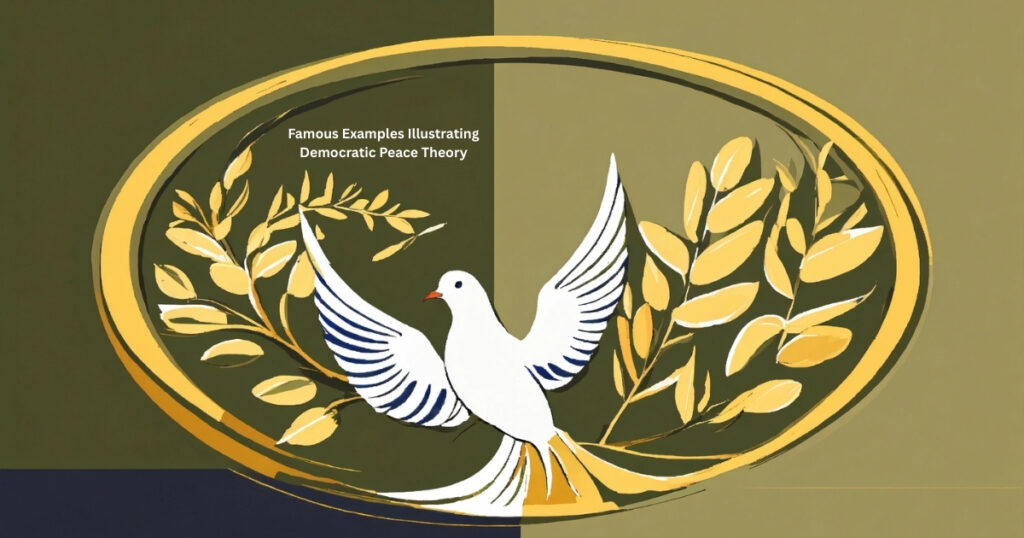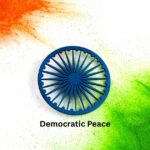The Concept of democratic peace is a widely accepted idea. In a world where conflicts are constantly evolving, the idea of “democratic peace” offers a hopeful perspective for building a stable future. This theory proposes that democracies are less likely to go to war with each other, a notion that has profound implications for global politics, especially in regions like America and Europe, where democratic values are deeply rooted. In this article, we’ll explore what democratic peace means, trace its origins, examine famous examples, and assess its relevance in today’s world.
Defining Democratic Peace Theory
The Democratic Peace Theory is based on the principle that democratic nations are generally more inclined to coexist peacefully, avoiding wars and fostering cooperation among themselves.
This concept has its roots in the philosophical writings of Immanuel Kant, who proposed that republican forms of government could promote peace.
Kant argued that when the power to declare war rests with citizens who would bear the consequences, nations would lean toward diplomacy over conflict.
This idea gained traction over the years, with scholars like Michael Doyle in the 1980s adding empirical evidence to support it.
Doyle’s work demonstrated that democracies, due to shared political norms, transparency, and accountability, have a history of avoiding military conflicts with each other.
Democracies often prioritize negotiation and adhere to diplomatic norms, reflecting a fundamental respect for each other’s governance systems.
While not without exceptions, the theory suggests that democracies, recognizing each other’s legitimacy, are more likely to use diplomacy as a first response.
Historical Background of Democratic Peace Theory
Democratic Peace Theory gained significant attention after World War II, as the world sought ways to prevent future large-scale conflicts.
The devastation of two world wars led scholars and political leaders to seek governance systems that could foster lasting peace.
The Cold War era brought further urgency, with democratic and authoritarian blocs in direct opposition. Data and studies have shown that, despite engaging in conflicts globally, democracies rarely go to war against one another.
Numerous statistical analyses and case studies have supported the theory, reinforcing that democratic nations typically enjoy stable, peaceful relations.
Scholars suggest that common values of transparency, the rule of law, and respect for human rights encourage democracies to favor non-violent resolutions.
While critics argue that democracies are not inherently peaceful and may still engage in war with non-democratic nations, the idea of democratic peace remains a widely studied and applied concept in international relations.
Famous Examples Illustrating Democratic Peace Theory

To understand how Democratic Peace Theory operates, we can look at a few famous cases where democratic nations have established and maintained peaceful relations.
1. The United States and Canada
The United States and Canada share the world’s longest undefended border and have enjoyed peaceful relations since the early 19th century.
Despite differing political landscapes and economic interests, both nations have managed conflicts through diplomacy and mutual respect.
Their democratic systems, cultural similarities, and interconnected economies foster collaboration rather than conflict.
From trade agreements like NAFTA to shared military operations through NORAD, these neighboring democracies demonstrate how democratic peace contributes to stable, beneficial relations.
2. The European Union
The European Union (EU) provides a remarkable example of democratic peace at work. Following the devastation of World War II, European nations sought to prevent further conflicts by promoting economic and political cooperation.
The formation of the EU has played a significant role in achieving peace among European democracies. EU member states, all democracies, share political and economic goals that create interdependence.
This union has helped transform historic rivals into allies, creating a community where conflicts are addressed diplomatically.
Today, the EU is seen as a model for peaceful cooperation, with democratic values underpinning its policies.
3. The United Kingdom and France
The relationship between the United Kingdom and France is a testament to the power of democratic peace. Historically, these two countries were fierce rivals, engaged in numerous conflicts over centuries.
However, as they embraced democratic governance, their relationship transformed. Today, the UK and France work closely within frameworks like the EU and NATO, where they collaborate on defense, security, and economic policies.
Their partnership in World War II, and subsequent alliances, show how democracy can shift long-standing animosities toward cooperation and shared goals.
4. Eastern Europe Post-Cold War
Following the end of the Cold War, Eastern European countries transitioned to democracy, leading to greater regional stability.
Nations like Poland, Hungary, and the Czech Republic joined democratic alliances such as NATO and the EU, solidifying their commitment to peaceful relations.
By aligning with other democratic nations, these countries embraced democratic peace principles, contributing to regional stability.
The democratic framework allowed these nations to focus on development and integration rather than military conflict.
Criticisms and Limitations:
While Democratic Peace Theory is widely supported, it has its limitations and critics. Some argue that democracies are not inherently peaceful; rather, they may engage in conflicts with non-democratic nations.
For example, the United States and other democracies have been involved in military interventions in countries with authoritarian regimes.
Critics also point out that democracies may still experience internal conflict, and external peace does not necessarily guarantee internal stability.
Additionally, exceptions to the democratic peace exist. The theory assumes that democracies share certain standards of governance and respect for human rights, but these standards may vary widely.
When democratic norms are weak or violated, as seen in some cases of democratic backsliding, conflicts may arise.
Nonetheless, democratic peace remains a valuable framework for understanding international relations.
Relevance of Democratic Peace:
In today’s complex geopolitical landscape, Democratic Peace Theory continues to influence policy and diplomacy, especially in regions like the United States and Europe, where democratic values are emphasized.
Organizations like NATO and the United Nations are built on the premise of collective security among democracies.
These alliances, guided by principles of democratic peace, encourage cooperation to address global issues such as terrorism, climate change, and economic instability.
Democratic peace is also relevant when considering current global tensions. For instance, democracies around the world are collectively responding to challenges from non-democratic states, such as the rise of authoritarian regimes in Asia and elsewhere.
The theory suggests that strengthening democratic institutions can help foster global stability, making it a cornerstone of foreign policy discussions.
The concept of Democratic Peace Theory is also highly relevant to India, a nation that is both the world’s largest democracy and a key player in regional and global stability. Here’s how this theory applies to India:
1. Strengthening Regional Stability
India is surrounded by a diverse set of neighboring countries with various political systems, some democratic and others not.
Democratic Peace Theory suggests that democratic nations are less likely to go to war with each other, which is evident in India’s generally peaceful relations with other democracies in the region, such as Bhutan and Nepal.
With Pakistan, a country with a different political landscape and historical tensions, maintaining peace is more challenging.
However, Democratic Peace Theory underscores the potential for India to foster peace by encouraging democratic governance and institutions in neighboring states.
2. Promoting Democratic Alliances
India’s relationships with other major democracies—such as the United States, Japan, and the European Union- are guided by a shared commitment to democratic values, economic growth, and mutual respect.
These alliances serve as strategic pillars, reinforcing the idea that democracies can work together effectively for collective security and economic cooperation.
Organizations like the Quad (comprising the U.S., India, Japan, and Australia) demonstrate how democratic values can unite countries to address shared challenges, particularly in maintaining stability in the Indo-Pacific region.
3. Supporting Economic Development and Peaceful Trade
Democratic Peace Theory also applies to India’s trade policies and economic partnerships. India’s democratic governance, which respects the rule of law, property rights, and regulatory transparency, makes it an attractive partner for other democracies seeking stable economic relations.
These partnerships strengthen India’s economy, which, in turn, supports regional peace. India’s economic relationships with the EU, Japan, and the U.S. exemplify how democratic nations can leverage peaceful trade relations for mutual benefit.
4. Role in Global Peace Efforts
India’s foreign policy, grounded in principles of non-alignment and peaceful coexistence, aligns with democratic peace ideals.
As a leading democratic voice in the United Nations and other global forums, India actively contributes to peacekeeping missions and initiatives that promote democratic governance and human rights.
Democratic Peace Theory bolsters India’s position as a mediator and peace advocate in conflicts, supporting its aspirations for a permanent seat on the UN Security Council.
5. Inspiring Internal Unity and Stability
Within India, democratic peace principles support internal unity, especially in a nation as diverse as India. With its wide range of cultural, religious, and ethnic groups, India relies on democratic institutions to manage diversity and maintain internal stability.
By providing a democratic framework that allows various groups to voice their needs and resolve conflicts peacefully, the theory of democratic peace is foundational to India’s success as a unified yet diverse nation.
For India, Democratic Peace Theory underscores the importance of democratic governance, both domestically and internationally, as a means of promoting peace, stability, and prosperity.
It highlights India’s potential to be a role model for other nations, showing how democracy can support a peaceful, cooperative approach in a region that often faces political tensions.
As India continues to rise on the global stage, democratic peace principles can guide its efforts to foster stability both within its borders and beyond, solidifying its role as a peaceful leader in the international community.
Conclusion:
The concept of democratic peace offers valuable insights into how democracies interact and maintain stability in a turbulent world.
From historical rivalries transformed into alliances, such as between the UK and France, to modern examples like the EU, democratic peace highlights the potential for cooperation and conflict resolution among democracies.
While the theory is not without its critics, it remains a useful tool for understanding and promoting peace in the modern era.
For readers in America and Europe, where democratic governance is a foundation of society,
Democratic Peace Theory serves as a reminder of the benefits of political accountability, mutual respect, and diplomacy.
As the world faces new challenges, embracing democratic values could be key to ensuring a peaceful future for all.
You can also read: Concept of State in Political Science










